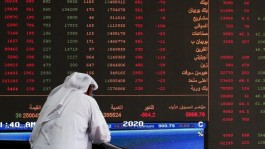The UAE is the biggest beneficiary among emerging market borrowers as lower US Treasury yields push investors towards safe assets.
Investors anticipating losses in global stock markets, slowing U.S. growth and easing monetary policy by the Federal Reserve are boosting exposure to bonds rated AA in the Bloomberg Emerging Markets Sovereign Total Return Index, the highest-quality category, which saw the biggest gains in August. Bonds from the United Arab Emirates were the best performers in this category.
That put the UAE’s federal bonds, as well as those issued by each emirate, on a fourth straight monthly gain, the longest since 2021. The bonds have returned 8.1% since the end of April, outperforming 55 of the 70 bonds in the emerging markets index, including many high-yield bonds.
The UAE is in an ideal position.
The UAE has found itself ideally positioned as one of the safest emerging markets at a time when global bond yields are trending lower and investors are increasingly risk averse. Money managers are looking to countries with political and financial stability to weather what could be a turbulent rest of the year amid weak U.S. data and the noise of the presidential election.
“Although this rally was driven by large moves in US Treasuries, the appeal of UAE federal government bonds as well as individual emirates is based on very strong fundamentals,” said Fadi Jundi, bond portfolio manager at Arqaam Capital in Dubai. “Investors prefer a combination of dual surpluses, accumulated foreign exchange reserves, a lack of political noise and strong domestic support.”
The UAE has positive balances in both its budget and external accounts, and is expected to end 2024 with a current account surplus of 8.8% and a budget surplus of 4.7%, according to Bloomberg surveys. Moderate inflation, low unemployment and GDP growth approaching 4% annually complete the economic picture.
According to Jundi, given this financial solvency, the state at the federal level and the government of each emirate do not need to issue debt, but they do so to strengthen their position in the market and maintain the yield curve.
The UAE government has been booming in recent years thanks to rising oil and natural gas revenues. It is one of the richest countries in the world and one of the few countries to manage sovereign wealth funds worth more than $1 trillion.
Rare Emirati releases
Bond issuances are rare, with the federal government selling its fourth euro-denominated bond in June this year. The capital Abu Dhabi sold $5 billion of debt in April. There are unlikely to be any more bond sales this year, according to Jundi, who added: “It provides the benefit of rarity.”
However, money managers say government bonds remain vulnerable to moves in U.S. bond yields, with spreads already tight and the outlook for emerging markets dependent on divergent expectations on Federal Reserve policy.
“I’m still bullish, but this rally is likely to fade,” said Guillaume Tresca, global emerging markets strategist at Generali Asset Management in Paris. “US interest rates have gone up a lot, so there’s a risk of seeing an upward correction in US rates. So even if UAE bonds are able to outperform, higher US rates could weigh on overall returns.”
However, UAE bonds remain attractive to investors due to their credit quality, according to Treska, who said that strong balance sheets should support the state at the federal level and Abu Dhabi, and some individual factors, such as the real estate boom in Dubai, should also help.






































